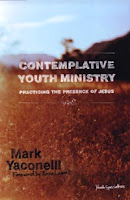
I've just finished reading "Contemplative Youth Ministry" by Mark Yaconelli (2006: Youth Specialties). It's a brilliant book for those who are struggling with what it means to be involved in youth ministry, or just starting out in youth ministry. While some of the comments in it are more geared towards the North American market, there are some pearls in this book that should make it recommended reading (even if you don't agree with it all, it's worth being challenged by some of Yaconelli's thoughts). Some key points that stood out for me:
"Contemplation means "being" with God within the reality of the present moment. Contemplation is about presence [Yaconelli discusses being "present" with students later]. It's about attentiveness - opening our eyes to God, ourselves, and others." [p 23]
"If love is a gift, then the first step in living into that love is to surrender. We need to stop trying to make kids love God (or make God love our kids) ... Once we admit that we are powerless to turn kids into Christians, we can recognize that ministry is a series of small acts of trust. It's more about yielding to what is already present and available than it is about creating or building." [p 72]
The table on pages 79-80 talking about the difference between anxiety and love displays in a very helpful way the two mentalities we can have about youth ministry (I know which one I'd rather be involved with!)
"The love of God is often more powerful and transformative in these small acts of love [talking about Jesus' acts of kindness] than in the lights, energy, and charisma of large outreach events. What if we became more aware of the small ways in which we engage young people? What if our ministry was about giving rides home, sharing snacks, opening doors, helping carry book bags, and giving compliments when a young person has taken great care in his appearance? ... We become aware, as Jesus suggests, that in these acts of love we're not just carrying a book bag for a young person, we're also making contact with Jesus. We begin to feel more and more that we're participating in God's mission of love, rather than serving some moral ideal." [p 115-116]
"Youth ministry is about holding a young person's deepest identity until he or she is able to see it too" [p 121]
The awareness examen [discovered by Ignaitus of Loyola] is a tool I intend to use with my leaders, my students, but also myself. It "asks you to review a particular encounter ... and prayerfully ask two questions: For what moment am I most grateful? For what moment am I least grateful?" [p 132]
"Our first task as youth ministers is to be with young people just as Jesus was with people" [p 180]
"One of the first ways we can help youth become more aware of their life in God is to point to the moments when Jesus seems near" [p 183]
"The purpose of integrating contemplative presence in youth ministry is not to turn kids into monks, nor is it to make us experts in contemplative prayer; it is to deepen our awareness of God, others, and self so that we might become fully alive ... Engaging kids solely in contemplative exercises is unnatural, because contemplative prayer does not lead to more contemplative prayer - it leads to authentic action" [pp 230-231]
Lots to ponder...
Hmm... this is the second review I've seen today on this book. Maybe I should check it out. Thanks for mentioning it, man!
ReplyDelete